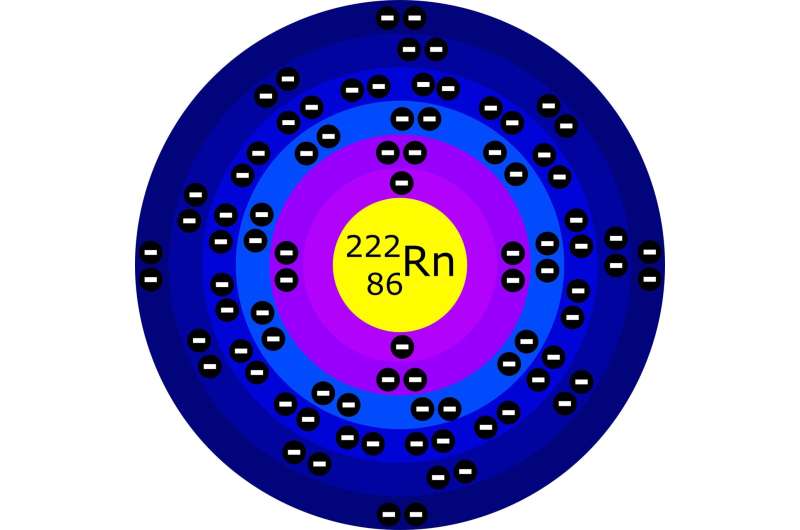This article has been reviewed according to Science X's editorial process and policies. Editors have highlighted the following attributes while ensuring the content's credibility:
fact-checked
peer-reviewed publication
trusted source
proofread
Is radon linked to health conditions other than lung cancer?

Radon, a naturally occurring radioactive gas produced when metals like uranium or radium break down in rocks and soil, is a known cause of lung cancer. Now, new research has found exposure to high levels of this indoor air pollutant is associated with an increased risk of another condition in middle-aged to older female participants with ischemic stroke. The study is published in Neurology. Ischemic stroke is caused by a blockage of blood flow to the brain and is the most common type of stroke.
The condition, called clonal hematopoiesis of indeterminate potential (CHIP), develops when some hematopoietic stem cells, the building blocks for all blood cells, undergo genetic mutations as a person ages. Cells with such mutations replicate more quickly than cells without them. Previous research has shown people with CHIP may have a higher risk of blood cancers like leukemia and cardiovascular disease, including stroke.
"Radon is a known mutagen, meaning it can cause genetic mutations," said study author Eric A. Whitsel, MD, MPH, of the University of North Carolina in Chapel Hill. "It is also a growing concern because this gas makes its way into homes, and exposure is increasing as modern construction practices make homes more airtight. We wanted to determine if exposures to high radon levels are linked to this condition called CHIP, caused by genetic mutations in hematopoietic stem cells."
The study involved 10,799 female participants with an average age of 67. Approximately half of the participants had a stroke or blood clots.
Researchers linked participants' home addresses to U.S. Environmental Protection Agency (EPA) data on average indoor radon concentrations by county to determine radon exposures. The EPA recommends that average indoor radon concentrations do not exceed four picocuries per liter (pCi/L).
Participants were divided into three groups. The highest group lived in areas where average radon concentrations were more than four pCi/L. The middle group lived in areas with average concentrations between two and four pCi/L. The lowest group lived in areas with average concentrations of less than two pCi/L.
Researchers then used genetic testing to determine which participants had mutations typical of CHIP. Researchers found that 9.0% of participants living in areas with the highest radon concentration had CHIP, compared to 8.4% of those living in areas with medium concentrations and 7.7% of those with the lowest concentrations.
After adjusting for factors such as age, education, race, and ethnicity, researchers found participants with ischemic stroke living in areas with the highest concentrations of radon had a 46% increased risk of CHIP, while those living in areas with medium concentrations had a 39% increased risk compared to those living in areas with the lowest concentrations of radon. The risk was not increased in participants without stroke.
"Although the results do not support an association between radon and CHIP among female participants overall, they do suggest an association between radon and CHIP among participants with ischemic stroke," said Whitsel. "A reason for this association has yet to be confirmed. Future studies are needed further to explore possible links between radon exposure and stroke, especially since current public health screening and prevention efforts for radon focus only on lung cancer."
A limitation of the study was that it only included middle-aged or older female participants, so the results may not be the same for other populations.
More information: Neurology (2024).




















